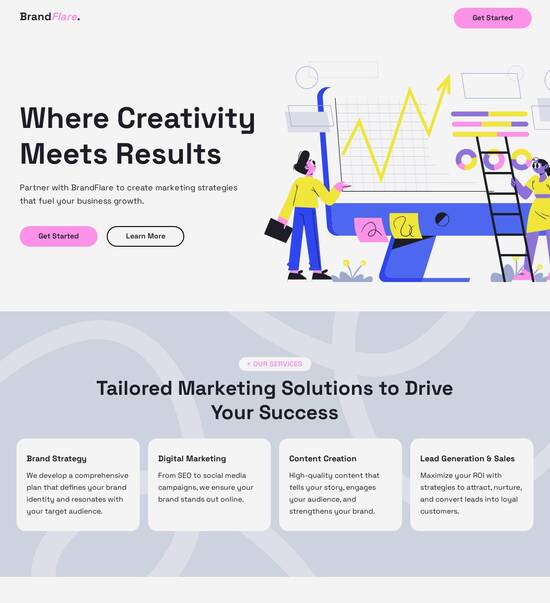
Web page template for Python developers
Use TemplateAbout template
Attract clients and showcase your skills with style using our landing page templates for Python developers. Let's convert those visitors into clients!
Recommended templates

Easy to build without coding
With the intuitive drag-and-drop builder, anyone on your team can create high-converting pages without any knowledge of code or design. Make enhancements to your landing page with custom widgets using Javascript, HTML/CSS, or third-party scripts.

Multiple layouts for any industry and goal
Select from 500+ landing page layouts built to boost conversions across industry-specific scenarios. Customize them by adjusting fonts, adding images, and generating on-brand content with the AI assistant. Quickly scale with Instablocks® and Global Blocks that you can save, reuse, and update globally.

Loads fast and looks polished on any device
Every template is responsive, which means they present professionally on any device and load blazingly fast with our Thor Render Engine. You can also power them up with Google AMP technology to deliver an unparalleled mobile experience and drive higher conversions.

Robust analytics & experimentation
Get real-time updates and reporting across all your devices, showing the number of visitors, conversions, cost-per-visitor, and cost-per-lead. Launch AI-powered experiments, run A/B tests, and use heatmaps to analyze user behavior, then optimize your landing page to maximize conversions.







Easy to build without coding
With the intuitive drag-and-drop builder, anyone on your team can create high-converting pages without any knowledge of code or design. Make enhancements to your landing page with custom widgets using Javascript, HTML/CSS, or third-party scripts.
Multiple layouts for any industry and goal
Select from 500+ landing page layouts built to boost conversions across industry-specific scenarios. Customize them by adjusting fonts, adding images, and generating on-brand content with the AI assistant. Quickly scale with Instablocks® and Global Blocks that you can save, reuse, and update globally.
Loads fast and looks polished on any device
Every template is responsive, which means they present professionally on any device and load blazingly fast with our Thor Render Engine.
Robust analytics & experimentation
Get real-time updates and reporting across all your devices, showing the number of visitors, conversions, cost-per-visitor, and cost-per-lead. Launch AI-powered experiments, run A/B tests, and use heatmaps to analyze user behavior, then optimize your landing page to maximize conversions.
All the features you need to build lead-generating landing pages
Explore more featuresLearn how to build top-performing landing pages for any goal
FAQs
Leading the way in building high-performing landing pages





A comprehensive step-by-step guide to optimizing your marketing campaigns with Instapage
For any marketer aiming to enhance their digital marketing strategy, understanding how to leverage landing page and conversion rate optimization (CRO) tools is crucial. Instapage offers a powerful platform that streamlines this process, helping businesses in various verticals such as tech, education, and financial services maximize their ROI through effective landing page strategies.
Understanding the importance of landing pages
Landing pages are essential for capturing leads and conversion. They focus on specific actions that you want visitors to take, and optimizing these pages is crucial for increasing conversion rates. Instapage provides marketers with the tools required to craft compelling landing pages that not only attract traffic but also engage and convert visitors effectively.
- Higher conversion rates: Tailored landing pages significantly improve conversion rates by aligning messages with audience expectations.
- Improved user experience: Clean designs and fast load times lead to better user experiences, decreasing bounce rates.
- Data-driven optimization: Utilize built-in analytics and A/B testing to continually refine landing page effectiveness.
How to create effective landing pages with Instapage
Creating a landing page doesn't have to be overwhelming. Here’s how to do it efficiently using Instapage:
- Choose a template: Start with one of the 100+ high-converting templates suitable for your industry.
- Customize content: Use the intuitive drag-and-drop builder to modify your landing page copy, images, and design elements.
- Add lead generation forms: Integrate pre-built lead generation elements to capture visitor information.
Optimizing your landing page for conversions
Optimization doesn't end with creation. Leverage the following features within Instapage for better results:
- A/B testing: Experiment with different headlines, images, and content to see what resonates most with your audience.
- Heatmaps: Analyze user behavior on your landing page to identify which areas attract attention and which elements need tweaking.
- Personalization: Use dynamic text replacement and audience segmentation to tailor your messaging.
Collaborating for optimal results
Speed and efficiency in collaboration are valuable in a fast-paced marketing environment. Here’s how Instapage facilitates synergy:
- Real-time feedback: Communicate with team members or external stakeholders instantly to make adjustments.
- Version tracking: Keep track of changes and revert to previous versions if necessary for safety.
- Secure sharing: Easily collaborate with clients or other departments without compromising security.
By following these steps with Instapage, you can ensure that your landing pages not only attract traffic but also convert visitors into leads or customers, optimizing your overall marketing efforts.
Ready to elevate your marketing strategy? Sign up for Instapage today and start maximizing your campaign results!
People also ask about Web page template for Python developers
Web page templates for Python developers: Streamlining your development process
The advantages of utilizing web page templates for Python developers
Web development can often feel overwhelming, especially when managing the intricate details of design and functionality. For Python developers, web page templates emerge as a solution that addresses core challenges. By implementing templates, developers can optimize their workflow, allowing them to focus on the unique aspects of their projects without getting bogged down by repetitive constructs.
One of the main benefits of web page templates is the streamlined development processes they provide. By using pre-designed structures, developers can simplify repetitive tasks like styling and layout configurations. This efficiency not only reduces development time but also minimizes coding errors associated with manual repetitions. As a result, the speed and effectiveness of project delivery are substantially enhanced.
Simplification of repetitive tasks saves valuable development time.
Reduced coding errors thanks to pre-tested templates leads to increased stability.
Improved speed and efficiency in project delivery create a competitive edge.
Customization is another key advantage of using web page templates. Developers can modify templates extensively to align with specific project needs, ensuring that the final product reflects the desired aesthetic and functionality. Furthermore, integration with popular frameworks such as Flask and Django becomes seamless, leveraging community resources and established practices.
Effective components of a web page template
Effective web page templates are characterized by their ability to promote reusability. Utilizing Python functions within templates allows developers to establish reusable components for headers, footers, and other common UI elements. By encapsulating functionality within these reusable components, they not only improve code maintainability but also make updates easier and more efficient across the project.
For instance, if a developer needs to modify the header, they can do so in one location rather than across numerous files, significantly reducing the potential for errors. This encapsulation of functionality fosters a structured approach to building web applications. Similarly, utilizing templating engines like Jinja2 enables dynamic content injection, making it possible to display content from various data sources seamlessly.
Emphasis on reusable components simplifies maintenance.
Dynamic content can be efficiently displayed using templates.
Streamlined processes for managing content updates enhance teamwork.
User-friendly features and enhancements
To keep pace with modern user expectations, web page templates must feature built-in responsive designs. With a mobile-first design approach, templates can adjust seamlessly to various screen sizes, ensuring consistent and engaging user experiences. Popular responsive frameworks can complement Python templates, providing a versatile toolkit for developers aiming to create visually appealing applications.
Additionally, incorporating IOLazy technology is essential for optimizing load performance. By implementing lazy loading strategies for images and content, developers can significantly enhance the perceived speed of their applications. Techniques such as loading images only when they come into the viewport can help maintain fast loading speeds, contributing to a smoother user experience and improved site performance.
Mobile-first design ensures accessibility across all devices.
Responsive frameworks enhance layout adaptability.
Optimizing load performance via IOLazy improves user engagement.
Document interaction and user engagement
Engaging users effectively requires an understanding of document interaction techniques. Implementing event listeners is a powerful way to enhance user interfaces. For instance, by utilizing the document.addEventListener method, developers can create interactive elements that respond to user actions like clicks and scrolls. This interactivity helps capture user attention and fosters a more engaging experience.
Approaching the DOMContentLoaded event also plays a significant role in optimizing initial page loads. Delaying non-essential scripts until the content is ready ensures that users experience a smoother transition when visiting a site. This technique reduces frustration and enhances perceived performance, focusing on delivering relevant information as quickly as possible.
Event listeners create an interactive UI experience.
DOMContentLoaded optimizes initial page load times.
Managing script execution enhances overall user experience.
Security and best practices in template development
Security remains a paramount consideration in web development, particularly when dealing with user inputs. Ensuring proper sanitization and validation of user inputs helps prevent common vulnerabilities such as SQL injection and cross-site scripting (XSS). By employing libraries such as Flask-WTF for form handling, developers can implement standardized validation procedures and maintain a secure environment.
Moreover, leveraging environment variables for configuration is essential for acting responsibly with sensitive information. Storing API keys and sensitive data outside the codebase enhances security and aligns with best practices. It’s critical for developers to remember that configuration management should be handled with care to shield critical information from unauthorized access.
Input validation is crucial for security in template forms.
Using libraries ensures standardized security measures.
Environment variables help secure sensitive configurations.
Case studies and real-world applications
Real-world implementations provide valuable insights into the effectiveness of web page templates in Python projects. For instance, numerous educational platforms have successfully integrated templates to maintain consistent branding while allowing for rapid deployment. These platforms benefit from customization that caters to specific learning needs, leading to enhanced user engagement.
Furthermore, a comparative analysis with non-Python solutions reveals several advantages. Python templates not only streamline the development process but also allow for better integration with back-end functionalities. This often results in improved workflow and reduced overhead, especially when migrating existing projects to more modern solutions.
Successful template use cases highlight efficiency in Python projects.
Streamlined processes enhance collaboration and reduce errors.
Comparative benefits showcase advantages of Python over traditional solutions.
Future trends in web page templates for Python developers
Emerging technologies are continually shaping the landscape of web development, and web page templates are no exception. The integration of AI technologies is anticipated to revolutionize template design, allowing for smarter customization and automatic adaptation to user data. This evolution is set to improve user experiences and interactively personalize content delivery.
Community-driven initiatives also play a crucial role in the future of web page templates. Open source templates can create a collaborative environment where developers share insights and enhancements. The proliferation of template-sharing platforms enables developers to benefit from each other’s work, encouraging efficient development practices across the Python community.
AI enhancements promise improved template design and usability.
Community contributions foster collaboration and sharing.
Continually evolving practices will guide template development.
Conclusion: Revolutionizing Python development with templates
In conclusion, web page templates are indispensable tools for Python developers. They not only streamline development processes but also enhance customization, user engagement, and security. As trends evolve and new practices emerge, the increasing significance of templates in web development will further empower developers to meet user expectations and harness the full potential of their projects.
As we look toward the future, ongoing innovation in template design and continued contributions from the community will drive best practices in web development. The growing emphasis on optimization, collaboration, and security ensures that web page templates remain a fundamental component of successful Python projects.
Ready to skyrocket conversions?
Supercharge your ad campaigns with high-performing landing pages
Get started














